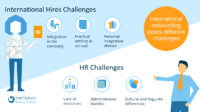Category: Recruiting
Recruiting is changing at a rapid pace. Some organizations are abandoning traditional methods for social media; some think software can do a better job than people.
A well-structured onboarding process is key to winning the hearts and minds of new employees. It not only defines a new hire’s first impression of a company but also influences his or her level of commitment to the new employer.
The talent shortage has claimed another victim: the banking industry. Turnover continues to increase and retaining and recruiting talent are major considerations banks have to take into consideration. One way for banks to stand out in the war for talent is to offer more pay as a means to attract talent, finds new survey data. […]
Social media can be a simple and cost-effective way to connect with potential job candidates. Most employers today use social media in some capacity, but not all use it for recruiting. Let’s take a look at some tips for doing just that.
The gig economy is beginning to take over the modern-day workforce. Over half of U.S.-based businesses already rely on freelance workers or contractors, and most Millennials and members of Generation Z desire flexible or remote work arrangements.
I hate to be “that guy,” but the holiday season is quickly approaching. Have you hired your temporary staff yet? I know, I know, Halloween is less than a month away, and the kids just went back to school, but if you aren’t prepared for the holiday rush now, you may be putting your company […]
Does your organization offer relocation assistance for employees? Many employers have opted to do so, especially in a tight labor market where some positions are difficult to fill in a specific geographic location.
Try and discover reasons women are not applying for jobs at your company. You can start by looking at your job announcements and recruitment. Examine the way your jobs are advertised, the networks they’re being sent to, or whether recruiting is being done with a recruiting company that isn’t focusing on women applicants.
Research conducted by Jobscan found that 98% of Fortune 500 companies use applicant tracking systems (ATSs), and a Kelly OCG survey estimated 66% of large companies and 35% of small organizations also rely on ATS software.
How often does your organization conduct a job analysis? Is this something that is done routinely or only when a job vacancy must be filled? Is there a formal process involved?
The historically low unemployment of recent years has drawn attention to what many employers woefully refer to as the “skills gap,” which is the idea that even though there are applicants for an open position, there aren’t enough applicants who meet the qualifications.












